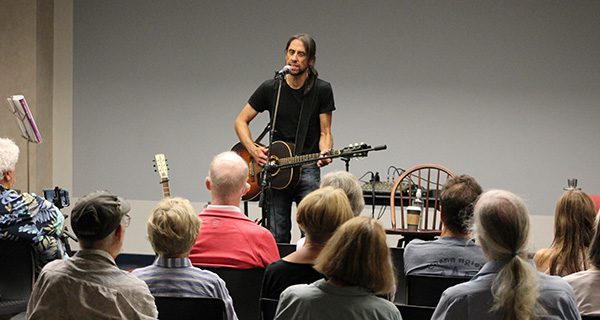[ccfic caption-text format="plaintext"]
By James Kinneen
Hometown Weekly Reporter
At most summer concerts, the most musical knowledge you’re going to get typically comes in the form of a fun fact or two about who originally performed the song.
That’s not the performers’ fault - few have the abundance of musical knowledge that Jon Waterman has.
With a Masters in Pop Music History from Prescott College, Waterman was able to present an educational concert on the roots of American popular music to cap off the Wellesley Library’s summer concert series on Wednesday, August 14.
Waterman began by noting how the invention of the phonograph made music “much less of a social experience, which was something musicians needed to adapt to.” With this happening, Ralph Peer of Victor Records heads to the South in 1927 to record the music of the southern Appalachians, believing “people in rural areas would like to hear music from people like themselves, that reflected their own lives.”
Named after the earliest ways music was recorded, Waterman’s song, “Press it in Wax,” tells this story of Peer’s sojourn to the South, which would ultimately conclude with his discovering the Carter family and Jimmie Rodgers.
Other than Peer, the song mentions Sam Phillips, as well as John and Alan Lomax. In 1934, the Lomaxes went to a prison in Sugarland, Texas, and recorded Ironhead Baker performing “St. James Infirmary Blues,” his own unique addition to the “Rake” cycle. The “Rake” cycle is a group of songs all about a dying man singing about what he’d like at his funeral, the most famous of which is “Streets of Laredo.”
While the other songs in the “Rake" cycle are in major keys, “St. James Infirmary Blues” is in a minor key. Why? While there is no conclusive answer, Waterman raised the hypothesis that it’s likely one of many black cowboys could have played “Streets of Laredo” in a minor key as it was passed back and forth between cultures.
Waterman performed “St James Infirmary Blues,” then sang “Dockery Farm," a song about the famed plantation where so many musicians got their start, including Robert Johnson. Waterman noted that the most likely answer as to where the sound originated is that a mysterious figure named Henry Sloan taught the men that worked on the farm how to play what would become Mississippi Delta blues - though a far more fantastical version of events has the devil teaching them in exchange for their souls.
Why it’s called the blues is another mystery that has a few possible answers, but one makes more sense than others. After discussing minstrelsy and singing “Thomas Rice and his Traveling Review," Waterman explained how one of the biggest stars of the black vaudeville scene was a young prodigy named Butler May. May was both a singer and comedian, but was criticized for being far too vulgar. Likely because of “Blue Laws," a synonym for vulgar was blue, thus the possible origin of the “blues.”
Known for his song about his time on The Titanic (much of the song’s humor originated in the fact that blacks weren’t allowed on The Titanic), Waterman paid homage to the young man that met his unfortunate end at age 23 by performing “Butler May.”
Waterman talked about how “The Ship That Never Returned” became “The Wreck of Old 97,” which became “Charlie on the MTA.” Waterman performed “The Wreck of Old 97” after noting how the success of the song led to an “event song” craze, during which time there were all sorts of songs about fires and other disasters.
There were far more songs and stories - from how Jimmy Rodgers recorded with a Hawaiian steel guitar player (and in turn introduced the steel guitar to country music), which Waterman noted before playing “Riding With Jimmy Rodgers,” to “Hughie Cannon’s Blues," his biography of the famed ragtime pianist.
Waterman unfortunately did not have time to cover when and where pop music eventually went so wrong, which is a shame.
The American music scene would be far better off if our most popular performers had Waterman’s talent and reverence for American music history.





















